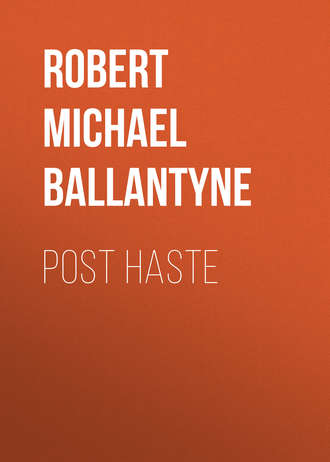
Robert Michael Ballantyne
Post Haste
Chapter Twenty.
The Post of the Olden Time
When the applause had subsided Solomon Flint caused a slight feeling of depression in the meeting by stating that the subject which he meant to bring before them that evening was a historical view of the Post-Office. Most of those present felt that they had had more than enough of the Post-Office thrust on their attention every day of their lives, and the irreverent member ventured to call out “Shop,” but he was instantly and indignantly called to order.
When, however, Solomon went on to state his firm belief that a particular branch of the Post-Office began in the immediate neighbourhood of the Garden of Eden, and that Adam was the first Postmaster-General, the depression gave way to interest, not unmingled with curiosity.
“You see, my young friends,” continued the lecturer, “our information with regard to the origin of the Post-Office is slight. The same may be said as to the origin of a’most everythink. Taking the little information that we do possess, and applying to it the reasoning power which was given to us for the purpose of investigatin’ an’ discoverin’ truth, I come to the following conclusions:—
“Adam was a tiller of the ground. There can be no doubt about that. Judging from analogy, we have the best ground for supposing that while Adam was digging in the fields Eve was at home preparing the dinner, and otherwise attending to the domestic arrangements of the house, or hut, or hovel, or cave. Dinner being ready, Eve would naturally send little Cain or Abel to fetch their father, and thus, you see, the branch of boy-messengers began.” (Applause, mingled with laughter and cheers.)
“Of course,” continued Solomon, “it may be objected—for some people can always object—(Hear, hear)—that these were not Post-Office messengers, but, my young friends, it is well known that the greater includes the less. As mankind is involved in Adam, and the oak is embedded in the acorn, so it may be maintained that the first faint germ of the Boy-Messenger Branch of the Post-Office was included in Cain and Abel.
“Passing, however, from what I may style this Post-Office germ, over many centuries, during which the records of postal history are few and faint and far between, we come down to more modern times—say five or six hundred years ago—and what do we find?” (Here Solomon became solemn.) “We find next to nothink! Absolutely next to nothink! The Boy-Messenger Department had indeed developed amazingly, insomuch that, whereas there were only two to begin with, there were in the 15th century no fewer than innumerable millions of ’em in every region and land and clime to which the ’uman family had penetrated, but no section of them had as yet prefixed the word ‘Telegraph’ to their name, and as to postal arrangements, w’y, they were simply disgraceful. Just think, now, up to the century of which I speak—the fifteenth—there was no regular Post-Office in this country. Letters were conveyed by common carriers at the rate, probably, of three or four miles an hour. Flesh and blood couldn’t stand that, you know, so about the close of the century, places, or ‘posts,’ were established in some parts of the country, where horses could be hired by travellers, and letters might be conveyed. The post-boys of those days evidently required spurring as well as their horses, for letters of the period have been preserved with the words ‘Haste, post haste’ on their backs. Sometimes the writers seem to have been in a particularly desperate hurry. One letter, written by a great man of the period, had on the back of it the words, ‘In haste; post haste, for thy life, for thy life, for thy life;’ and it is believed that this was no idle caution, but a threat which was apt to be carried out if the post-boy loitered on the way.”
It may be remarked that Solomon’s language became more refined as he proceeded, but lapsed into a free-and-easy style whenever he became jocular.
“The first horse-posts,” continued the lecturer, “were established for military purposes—the convenience of the public being deemed quite a secondary matter. Continental nations were in advance of England in postal arrangements, and in the first quarter of the sixteenth century (1514) the foreign merchants residing in London were so greatly inconvenienced by the want of regular letter conveyance, that they set up a Post-Office of their own from London to its outports, and appointed their own Postmaster, but, quarrelling among themselves, they referred their dispute to Government. James the First established a Post-Office for letters to foreign countries, for the benefit of English merchants, but it was not till the year 1635—in the reign of Charles the First—that a Post-Office for inland letters was established. It was ordained that the Postmaster of England for foreign parts ‘should settle a running post or two to run night and day between Edinburgh and London, to go thither and come back again in six days, and to take with them all such letters as shall be directed to any post-town in or near that road.’
“In 1640 the Post-Office was placed under the care and superintendence of the Principal Secretary of State, and became one of the settled institutions of the country.
“Here, then, we have what may be considered the birth of the Post-Office, which is now pretty nigh two centuries and a half old. And what a wonderful difference there is between this infant Post-Office and the man! Then, six days; now, less than a dozen hours, between the capitals of England and Scotland—to say nothing of other things. But, my lads, we must not turn up our noses at the day of small things.”
“Hear, hear,” cried little Grigs, who approved the sentiment.
“Lay it to heart then, Grigs,” said Peter Pax, who referred to the fact that little Grigs’s nose was turned up so powerfully by nature that it could not help turning up at things small and great alike.
Laughter and great applause were mingled with cries of “Order,” which Solomon subdued by holding up his hand.
“At the same time,” continued the lecturer, “bye-posts were set a-going to connect the main line with large towns, such as Hull, Lincoln, Chester, etcetera. These bye-posts were farmed out to private individuals, and the rates fixed at 2 pence a single letter to any place under 80 miles; 4 pence up to 140 miles; 6 pence to any more distant place in England; and 8 pence to Scotland.
“From that date forward the infant began to grow—sometimes slowly, sometimes quickly, now and then by spurts—just like other infants, and a horribly spoiled and mismanaged baby it was at first. Those who see it now,—in the prime of its manhood, wielding its giant strength with such ease, accomplishing all but miraculous work with so great speed, regularity, and certainty, and with so little fuss,—can hardly believe what a cross-grained little stupid thing it was in those early days, or what tremendous difficulties it had to contend with.
“In the first place, the roads in the land were few, and most of them inconceivably bad, besides which they were infested by highwaymen, who often took a fancy to rummage the mail-bags and scatter their contents. The post in those days was slow, but not sure. Then it experienced some trouble from other infants, of the same family, who claimed a right to share its privileges. Among these was a Post-Office established by the Common Council of London in direct rivalry to the Parliamentary child. This resulted in a great deal of squabbling and pamphleteering, also in many valuable improvements—for it is well known that opposition is the life of trade. The Council of State, however, came to the conclusion that, in an affair so thoroughly national, the office of Postmaster and the management of the Post-Office ought to rest in the sole power and disposal of Parliament; the City posts were peremptorily suppressed; opposition babies were quietly—no doubt righteously—murdered; and from that date the carrying of letters has remained the exclusive privilege of the Crown. But considerable and violent opposition was made to this monopoly. This is a world of opposition, my young friends”—the lecturer was pathetic here—“and I have no doubt whatever that it was meant to be a world of opposition”—the lecturer was energetic here, and drew an emphatic “Hear, hear,” from the Scotch members. “Why, it is only by opposition that questions are ventilated and truth is established!
“No doubt every member of this ancient and literary Society is well acquainted with the name of Hill—(great cheering)—Sir Rowland Hill, who in the year 1840 succeeded in getting introduced to the nation one of the greatest boons with which it has been blessed—namely, the Penny Post.” (Renewed cheering.) “Well, it is a curious and interesting fact that in the middle of the seventeenth century—more than two hundred years ago—a namesake of Sir Rowland (whether an ancestor or not I cannot tell), a Mr John Hill, wrote a pamphlet in which monopoly was condemned and a penny post suggested. The title of the pamphlet was ‘John Hill’s Penny Post; or, A Vindication of every Englishman in carrying Merchants’ or any other Men’s Letters against any restraints of Farmers of such Employment.’ So, you see, in regard to the Penny Post, the coming event cast its shadow about two hundred years in advance.
“The Creeping Era may be the title assigned to this period of Post-Office history. Little was expected of the Post-Office, and not much was done. Nevertheless, considering the difficulties in its way, our infant progressed wonderfully. Its revenue in 1649 was 5000 pounds. Gradually it got upon its legs. Then it monopolised post-horses and began to run. Waxing bolder, it also monopolised packet-boats and went to sea. Like all bold and energetic children, it had numerous falls, and experienced many troubles in its progress. Nevertheless its heart was kept up by the steady increase of its revenue, which amounted to 76,000 pounds in 1687. During the following seventy-eight years the increase was twofold, and during the next ninety years (to 1854) it was tenfold.
“It was hard times with the Post-Office officials about the beginning of last century.
“During what we may call the Post-boy Era, the officials were maltreated by robbers on shore and by privateers (next thing to pirates) at sea. In fact they were compelled to become men of war. And the troubles and anxieties of the Postmaster-Generals were proportionately great. The latter had to fit out the mail-packets as ships of war, build new ships, and sell old ones, provide stores and ammunition for the same, engage captains and crews, and attend to their disputes, mutinies, and shortcomings. They had also to correspond with the deputy-postmasters all over the country about all sorts of matters—chiefly their arrears and carelessness or neglect of duty—besides foreign correspondence. What the latter involved may be partly gathered from lists of the articles sent by post at that time. Among other things, we find reference to ‘fifteen couple of hounds going to the King of the Romans with a free pass.’ A certain ‘Dr Crichton, carrying with him a cow and divers other necessaries,’ is mentioned as having been posted! also ‘two servant-maids going as laundresses to my Lord Ambassador Methuen,’ and ‘a deal case with four flitches of bacon for Mr Pennington of Rotterdam.’ The captains of the mail-packets ought to have worn coats of mail, for they had orders to run while they could, to fight when they could not run, and to throw the mails overboard when fighting failed!
“Of course, it is to be hoped, this rule was not strictly enforced when doctors and females formed part of the mails.
“In one case a certain James Vickers, captain of the mail-packet ‘Grace Dogger,’ lay in Dublin Bay waiting till the tide should enable him to get over the bar. A French privateer chanced to be on the look-out in these waters, and pounced upon James Vickers, who was either unable or unwilling to fight. The French captain stripped the ‘Grace Dogger’—as the chronicler writes—‘of rigging, sails, spars, yards, and all furniture wherewith she had been provided for due accommodation of passengers, leaving not so much as a spoone, or a naile, or a hooke to hang anything on.’ Having thus made a clean sweep of her valuables, and having no use for the hull, the Frenchman ransomed the ‘Grace Dogger’ to poor J.V. for fifty guineas, which the Post-Office had to pay!
“But our mail-packets were not always thus easily or summarily mastered. Sometimes they fought and conquered, but, whatever happened, the result was invariably productive of expense, because wounded men had to be cared for and cured or pensioned. Thus one Edward James had a donation of 5 pounds, because ‘a musket shot had grazed the tibia of his left leg.’ What the tibia may be, my young friends, is best known to the doctors—I have not taken the trouble to inquire!” (Hear, hear, and applause.) “Then another got 12 pounds ‘because a shot had divided his frontal muscles and fractured his skull;’ while a third received a yearly pension of 6 pounds, 13 shillings, 4 pence ‘on account of a shot in the hinder part of the head, whereby a large division of scalp was made.’ Observe what significance there is in that fourpence! Don’t it speak eloquently of the strict justice of the Post-Office authorities of those days? Don’t it tell of tender solicitude on their part thus to gauge the value of gunshot wounds? Might it not be said that the men were carefully rated when wounded? One Postmaster-General writes to an agent at Falmouth in regard to rates: ‘Each arm or leg amputated above the elbow or knee is 8 pounds per annum; below the knee, 20 nobles. Loss of sight of one eye, 4 pounds; of pupil of the eye, 5 pounds; of sight of both eyes, 12 pounds; of pupils of both eyes, 14 pounds.’ Our well-known exactitude began to crop up, you see, even in those days.
“The post-boys—who in many instances were grey-headed men—also gave the authorities much trouble, many of them being addicted to strong drink, and not a few to dilatory habits and dishonesty. One of them was at one time caught in the act of breaking the laws. At that period the bye-posts were farmed, but the post-boys, regardless of farmers’ rights, often carried letters and brought back answers on their own account—receiving and keeping the hire, so that neither the Post-Office nor the farmer got the benefit. The particular boy referred to was convicted and committed to prison, but as he could not get bail—having neither friends nor money—he begged to be whipped instead! His petition was granted, and he was accordingly whipped to his heart’s content—or, as the chronicler has it, he was whipped ‘to the purpose.’
“Many men of great power and energy contributed to the advance of the Post-Office in those times. I won’t burden your minds with many of their names however. One of them, William Dockwra, started a penny post in London for letters and small parcels in 1683. Twenty-three years later an attempt was made to start a halfpenny post in London, but that was suppressed.
“Soon after that a great man arose named Ralph Allen. He obtained a lease of the cross posts from Government for life at 6000 pounds a year. By his wisdom and energy he introduced vast improvements in the postal system, besides making a profit of 12,000 pounds a year, which he lived to enjoy for forty-four years, spending much of his fortune in charity and in the exercise of hospitality to men of learning and genius.
“About the middle of last century—the eighteenth—the Post-Office, although greatly increased in efficiency, was an insignificant affair compared with that of the present day. It was bound to pay into the Exchequer 700 pounds a week. In Ireland and Scotland improvements also went on apace, but not so rapidly as in England, as might have been expected, considering the mountainous nature of these countries. In Scotland the first modern stage-coach was introduced in 1776. The same year a penny post was started in Edinburgh by a certain Peter Williamson of Aberdeen, who was a keeper of a coffee-stall in the Parliament House, and his experiment was so successful that he had to employ four carriers to deliver and collect letters. These men rang a bell on their rounds and wore a uniform. Others soon entered into competition, but the Post-Office authorities came forward, took the local penny post in hand, and pensioned Williamson off.
“It was not till the end of the century that the Post-Office made one of its greatest and most notable strides.
“The Mail-coach Era followed that of the post-boys, and was introduced by Mr John Palmer, manager of the Bath theatre. The post-boys had become so unbearably slow and corrupt that people had taken to sending valuable letters in brown paper parcels by the coaches, which had now begun to run between most of the great towns. Palmer, who afterwards became Controller-General of the Post-Office, proposed that mail-bags should be sent by passenger-coaches with trusty and armed guards. His advice, after some opposition, was acted on, and thus the mails came to travel six miles an hour, instead of three or four—the result being an immediate increase of correspondence, despite an increase of postage. Rapidity, security, regularity, economy, are the great requisites in a healthy postal system. Here, then, was an advance in at least two of these. The advance was slight, it is true, but once more, I repeat, we ought not to turn up our noses at the day of small things.” (Little Grigs was going to repeat “Hear! hear!” but thought better of it and checked himself.) “Of course there was opposition to the stage-coaches. There always is and will be opposition to everything in a world of mixed good and evil.” (The Scotsman here thought of repeating “Hear! hear!” but refrained.) “One pamphleteer denounced them as the ‘greatest evil that had happened of late years in these kingdoms,—mischievous to the public, prejudicial to trade, and destructive to lands. Those who travel in these coaches contract an idle habit of body, become weary and listless when they had rode a few miles, and were unable to travel on horseback, and not able to endure frost, snow, or rain, or to lodge in the fields.’ Opposition for ever! So it ever is. So it was when foot-runners gave place to horsemen; so it was when horseflesh succumbed to steam. So it will be when electro-galvanic aerial locomotives take the place—.” (The remainder of the sentence was lost in laughter and rapturous applause.) “But roads were still intolerably bad. Stage-coach travelling was a serious business. Men made their wills before setting out on a journey. The journey between Edinburgh and London was advertised to last ten days in summer, and twelve in winter, and that, too, in a so-called ‘flying machine on steel springs.’ But, to return:– Our infant, having now become a sturdy youth, advanced somewhat more rapidly. In 1792 a money-order office was set on foot for the first time. It had been originally undertaken by some post-office clerks on their own account, but was little used until the introduction of the penny postage. Great reforms were made in many departments. Among them was an Act passed to authorise the sending of letter-bags by private ships. This originated the ship-letter system, by which letters are now conveyed to every part of the world visited by private ships.
“Another mighty influence for good was the introduction (about 1818) of macadamised roads, which brought travelling up to the point of ten miles an hour. So also was the opening for use in 1829 of St. Martin’s-le-Grand—a grand event this, in every sense of the word.” (Here a member objected to punning, and was immediately hooted out of countenance.)
“With mail-coaches, macadamised roads, security, ten miles an hour, and a vastly increased revenue, the Post-Office seemed to have reached the highest heights of prosperity. The heights from which we now look down upon these things ought to make us humble in our estimate of the future! We have far surpassed the wildest dreams of those days, but there were some points of picturesque interest in which we can never surpass them. Ah! boys,” said Solomon, looking up with a gleam of enthusiasm in his eyes, “I mind the old mail-coaches well. They had for a long time before I knew them reached their best days. It was about the year 1820 that most of the post-roads had been macadamised, and the service had reached its highest state of efficiency. In 1836 there were fifty four-horse mails in England, thirty in Ireland, and ten in Scotland, besides forty-nine two-horse mails in England. Those who have not seen the starting of the mail-coaches from the General Post-Office can never understand the magnificence and excitement of that scene. The coaches were clean, trim, elegant, and glittering; the blood-horses were the finest that could be procured, groomed to perfection, and full of fire; the drivers and guards were tried and trusty men of mettle, in bright scarlet costume—some of the former being lords, baronets, and even parsons! It was a gay and stirring sight when the insides and outsides were seated, when the drivers seized their reins, and the bugles sounded, the whips cracked, the impatient steeds reared, plunged, or sprang away, and the Royal Mails flew from the yard of St. Martin’s-le-Grand towards every corner of the Kingdom.
“Their progress, too, was a sort of royal progress—a triumphal march. Wherever they had to pass, crowds of people waited for them in subdued excitement, hailed them with delight, and waved them on with cheers, for they were almost the only means of distributing news; and when a great victory, such as Trafalgar, Vittoria, or Waterloo had to be announced, the mail-coaches—dressed in flowers and ribbons, with guards shouting the news to eager crowds as they passed through hamlet, village, and town—swept like a thrill of electric fire throughout the land. News was news in those days! You didn’t get it at all till you got it altogether, and then you got it like a thunderbolt. There was no dribbling of advance telegrams; no daily papers to spread the news (or lies), and contradict ’em next day, in the same columns with commentaries or prophetic remarks on what might or should have been, but wasn’t, until news got muddled up into a hopeless entanglement, so that when all was at last cleared up you’d been worried out of all your interest in it! Yes, my lads, although I would not wish to see the return of those stirring days, I’m free to assert that the world lost something good, and that it was not all clear gain when the old four-in-hand Royal Mail coaches drove out of the present into the past, and left the Iron Horse in possession of the field.
“But nothing can arrest the hand of Time. When mail-coaches were at their best, and a new Great North Road was being laid out by Telford, the celebrated engineer, another celebrated engineer, named Stephenson, was creating strange commotion among the coal-pits of the North. The iron horse was beginning to snort. Soon he began to shriek and claw the rails. Despite the usual opposition, he succeeded in asserting himself, and, in the words of a disconsolate old mail-coach guard, ‘men began to make a gridiron of old England.’ The romance of the road had faded away. No more for the old guard were there to be the exciting bustle of the start, the glorious rush out of the smoky town into the bright country; the crash through hamlet and village; the wayside changings; the rough crossing of snow-drifted moorlands; the occasional breakdowns; the difficulties and dangers; the hospitable inns; the fireside gossipings. The old guard’s day was over, and a new act in the drama of human progress had begun.
“The Railway Era may be said to have commenced about the time of the opening of the Liverpool and Manchester line in 1830, though the railway system developed slowly during the first few years. Men did not believe in it, and many suggestions were made to accelerate the speed of mails in other ways. One writer proposed balloons. Another—Professor Babbage—suggested a series of high pillars with wires stretched thereon, along which letter-bags might be drawn. He even hinted that such pillars and wires might come to be ‘made available for a species of telegraphic communication yet more rapid’—a hint which is peculiarly interesting when we consider that it was given long prior to the time of the electric telegraph. But the Iron Horse rode roughshod over all other plans, and finally became the recognised and effective method of conveyance.
“During this half-century of the mail-coach period many improvements and alterations had been made in the working of the Post-Office.
“Among other things, the mails to India were despatched for the first time by the ‘overland route’—the Mediterranean, Suez, and the Red Sea—in 1835. A line of communication was subsequently extended to China and Australia. In the following year the reduction of the stamp-duty on newspapers to one penny led to a great increase in that branch of the service.
“But now approached the time for the greatest reform of all—that reduction of postage of which I have already spoken—namely, the uniform rate of one penny for all inland letters not exceeding a certain weight.
“The average postage of a letter in 1837 was 8 pence three farthings. Owing to the heavy rates the net proceeds of the Department had remained stationary for nearly twenty years. To mend this state of matters, Sir Rowland Hill fought his long and famous fight, the particulars of which I may not enter on just now, but which culminated in victory in 1840, when the Penny Post was established throughout the kingdom. Sir Rowland still (1879) lives to witness the thorough success of his daring and beneficent innovation! It is impossible to form a just estimate of the value of cheap postage to the nation,—I may say, to the world. Trade has been increased, correspondence extended, intelligence deepened, and mental activity stimulated.
“The immediate result of the change was to raise the number of letters passing through the post from seventy-six millions in 1839 to one hundred and sixty-nine millions in 1840. Another result was the entire cessation of the illicit smuggling of letters. Despite penal laws, some carriers had been doing as large a business in illegal conveyance of letters as the Post-Office itself! One seizure made, a single bag in the warehouse of a well-known London carrier, revealed eleven hundred such letters! The horrified head of the firm hastened to the Postmaster-General, and offered immediate payment of 500 pounds to escape the penalties incurred. The money was accepted, and the letters were all passed through the Post-Office the same night!
“Sir Rowland—then Mr—Hill had said that the Post-Office was ‘capable of performing a distinguished part in the great work of national education.’ His prophetic words have been more than justified. People who never wrote letters before write them now. Those who wrote only a few letters now write hundreds. Only grave and important subjects were formerly treated of by letter, now we send the most trifling as well as the most weighty matters by the penny post in such floods that there is scarce room to receive the correspondence, but liberal men and measures have been equal to the emergency. One objector to cheap rates prophesied that their adoption would cause the very walls of the General Post-Office to burst. Well, it has seemed as if his prophecy were about to come true, especially on recent Christmas eves, but it is not yet fulfilled, for the old place has a tough skin, and won’t burst up for a considerable time to come.” (Great applause.)
“Financially, too,” continued Solomon, “the Penny Post reform was an immense success, though at first it showed a tendency to hang fire. The business of the Money-Order Office was enormously increased, as the convenience of that important department became obvious to the public, and trade was so greatly improved that many tradesmen, at the end of the first three years, took the trouble to write to the Post-Office to tell how their business had increased since the introduction of the change. In short, the Penny Post would require a lecture to itself. I will therefore dismiss it with the remark that it is one of the greatest blessings of modern times, and that the nation owes an everlasting debt of gratitude to its author.
“With decreased rates came the other great requisites,—increased speed and security; and now, as you all know, the work of the Post-Office, in all its wide ramifications, goes on with the uniform regularity of a good chronometer from year to year.
“To the special duty of letter-carrying the Post-Office has now added the carriage of books and patterns, and a Savings-Bank as well as a Money Order department; but if I were to enlarge on the details of all this it would become necessary to order coffee and buns for the whole Society of literary message-boys, and make up our beds on the floor of Pegaway Hall—(Hear! hear! applause, and cries of ‘Go on!’)—to avoid which I shall bring my discourse to a close, with a humble apology for having detained you so long.”







